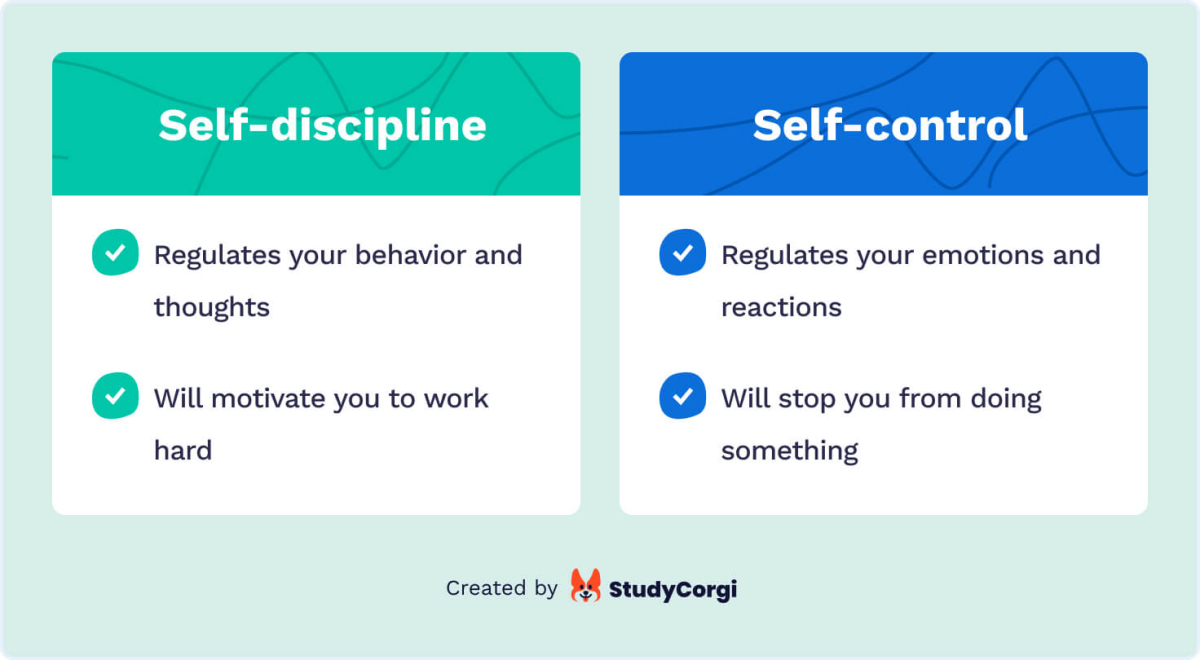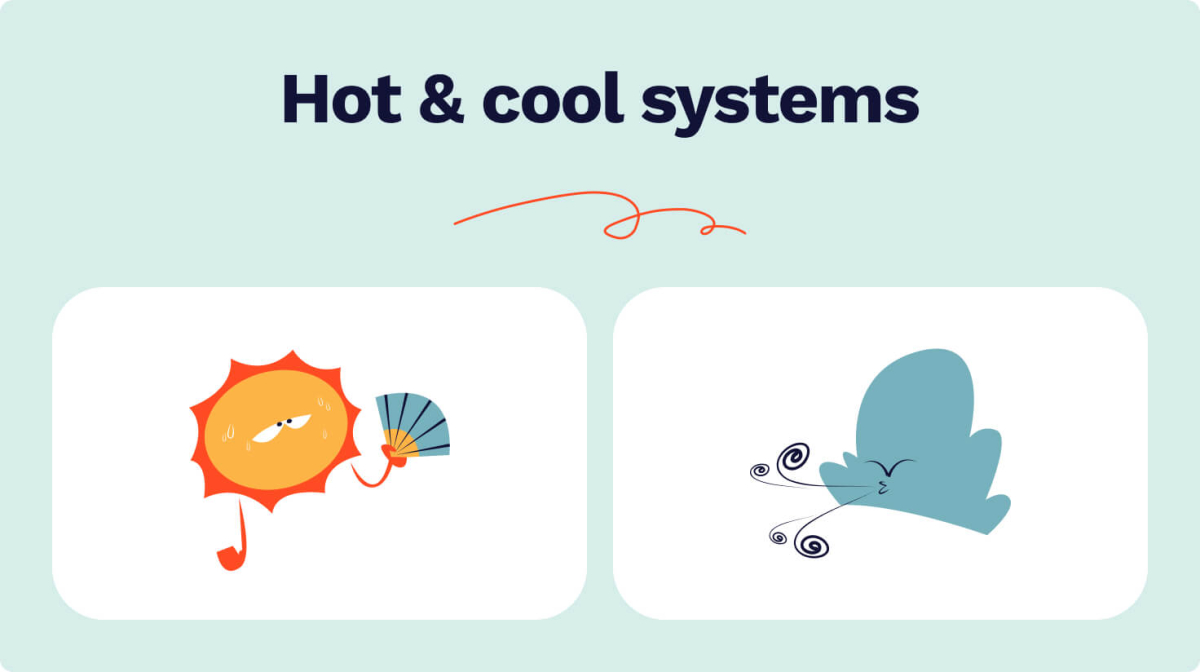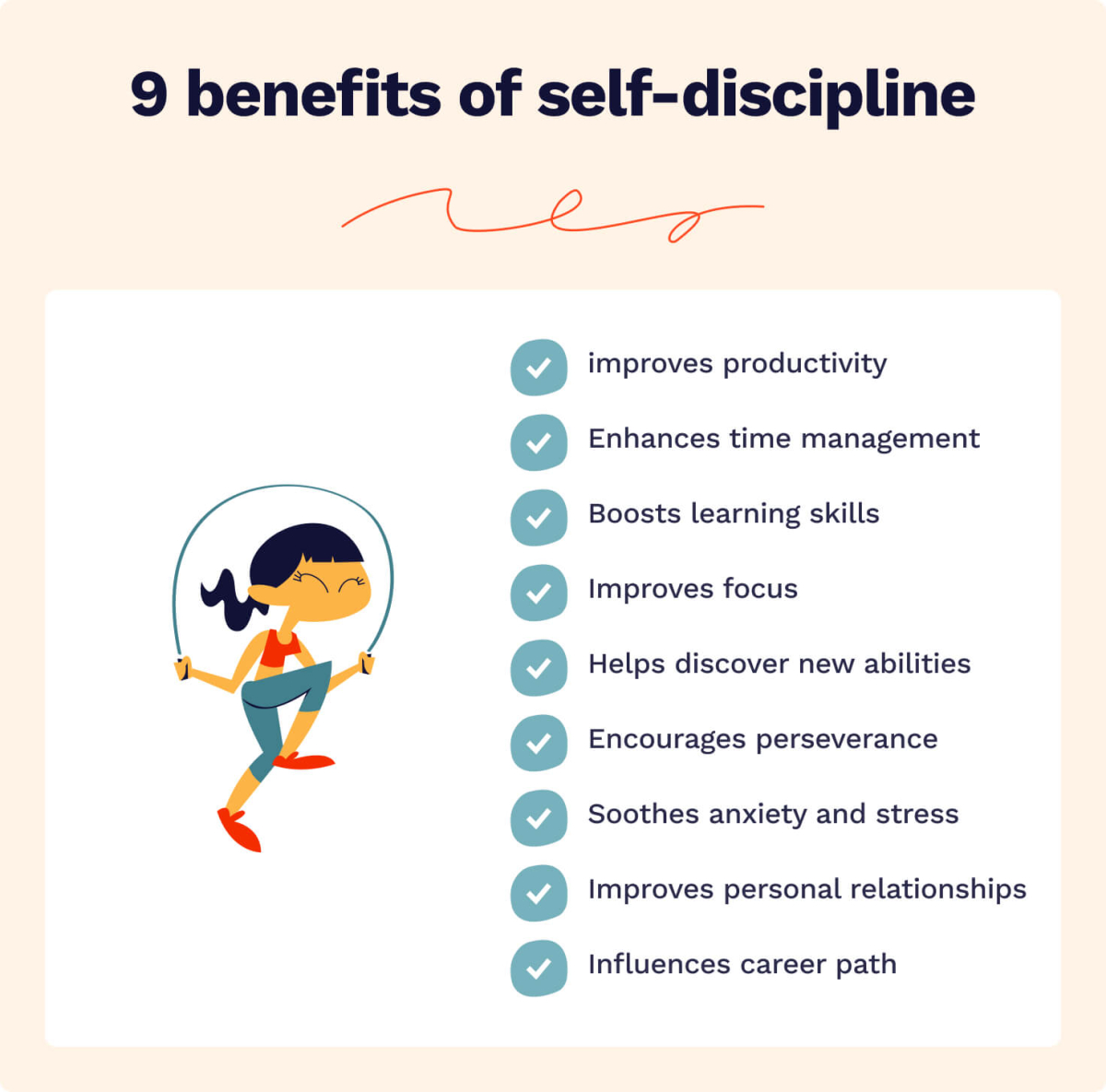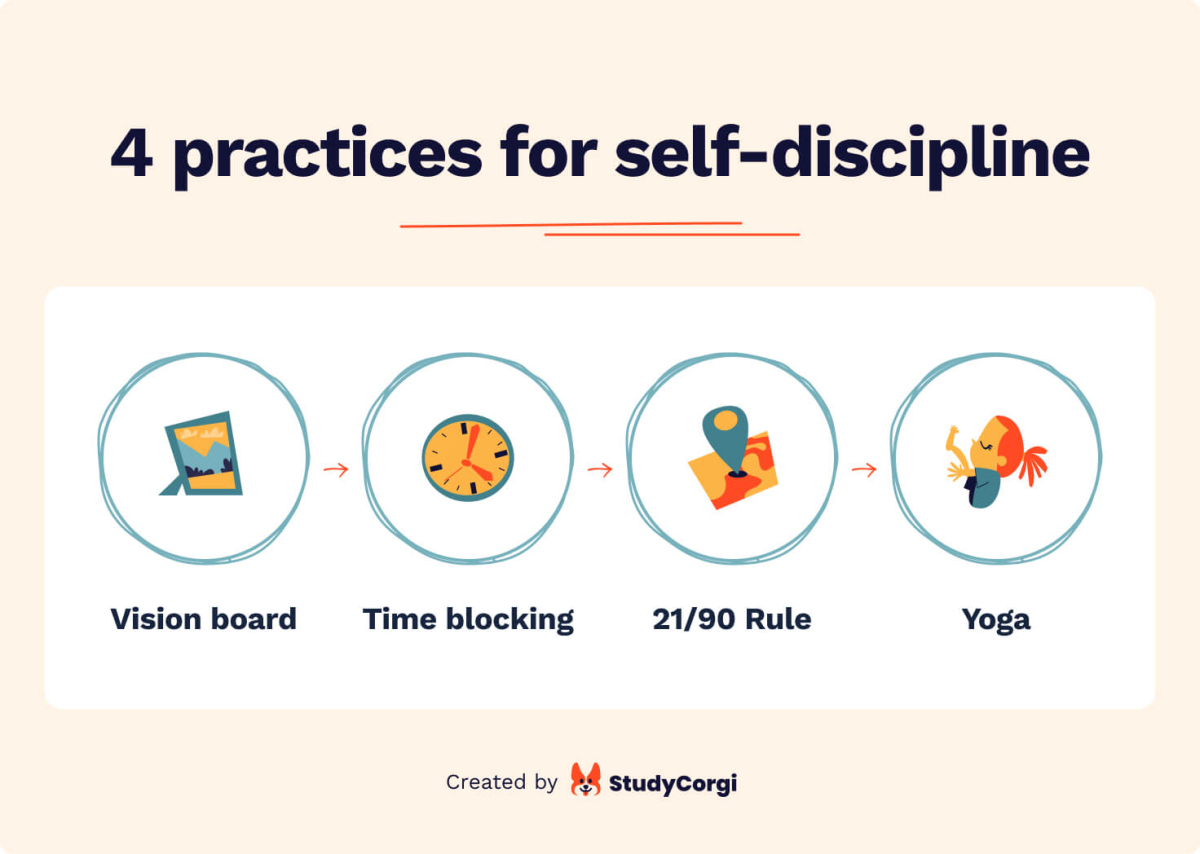Possessing self-discipline, even to a small degree, is essential when you’re a student. It will help you manage your time, keep focus, and resist distractions, which eventually bring you to achieving your study and life goals.
In this article, we share 11 effective tips on mastering the art of self-discipline for students. They are designed to help you attain your academic goals. Additionally, we provide 4 practices and discuss self-discipline examples for students.
🏅 What Is Self-Discipline?
Self-discipline entails regulating your behavior, thoughts, and emotions while overcoming impulses and temptations.

It is a significant skill that helps students control themselves and pushes them to work hard and behave according to their morals without others telling them to do so.
Some examples of student’s self-discipline are:
- Maintaining your focus on learning tasks
- Submitting assignments on time
- Attending lectures
- Studying to achieve your academic goals
Becoming self-disciplined is vital in college since you will encounter many distractions during this time.
Self-discipline helps you to control yourself and accomplish your goals. Besides, you will become more adept at time management, which will help you to succeed academically because you will focus on your priorities.
Self-Discipline vs. Self-Control
Self-discipline and self-control are two concepts that many people often use synonymously, but the two words have different meanings.

As mentioned above, self-discipline is the ability to make conscious decisions about your behavior and thoughts. Your mind has complete control of how you behave or socialize with others.
In contrast, self-control is more about regulating your emotions and the impulsive reactions you might experience to defend your body or ego from external attacks. It entails the capacity to control yourself despite your emotional state. You can comfortably remain calm and unaffected by your thoughts or the physical situations that may try to prompt an adverse reaction.
So, why are the two definitions so similar?
While the terms have different meanings, some situations require self-control to be disciplined in the challenges you undertake as a student.
Self-control will stop you from doing something, while self-discipline will motivate you to work towards something.
Here are some examples that help differentiate between self-discipline and self-control:
🤔 Why Should I Care about Self-Discipline?
Self-discipline is an essential attribute that helps students resist temporary temptations to accomplish long-term goals.
Why is self-discipline important?
It helps students remain focused on their goals while avoiding distractions and procrastination. It enables you to control yourself and how you react in certain situations.
Let’s explore several studies and factual findings that support self-discipline.
Marshmallow Test
The Marshmallow test was an experiment pioneered by Walter Mischel, Ph.D., a psychology professor who wanted to study the effects of delayed gratification.

The test involved a group of preschoolers who were each taken to a private room and given two choices.
Each child was told to choose between waiting 20 minutes to be rewarded with 2 marshmallows or being given 1 immediately. The children who waited practiced self-control and delayed their gratification, which predicted their future lives. After several years, those who waited longer had better grades, achieved their goals, and coped more easily with stress. However, those who didn’t wait faced a variety of addictions and had low self-control.
Self-Discipline and Academic Performance
According to research by Angela Duckworth, Ph.D., and Martin Seligman, Ph.D., self-discipline outperforms IQ regarding academic performance. The researchers experimented on eighth-graders to measure their self-discipline. The test included questionnaires about impulsive behaviors and delayed rewards. As per the findings, the self-disciplined students received better grades, no matter their IQ level. Other researchers have also arrived at similar results.
Impact of Childhood Self Control
Terrie Moffitt, Ph.D., of Duke University, and colleagues conducted a study to show the effects of instilling the value of self-control in young children. The study participants were 1,000 children monitored from birth until they were 32. The experiment suggested that self-control is vital for good physical health, better handling of personal finances, and avoiding substance dependence. Another experiment with 500 pairs of siblings revealed that those with low self-control had poor outcomes in life despite being raised with the same family values.
🔎 How Does Self-Discipline Work?
Let’s explore how self-discipline works by returning to the Marshmallow test and considering the science behind it in more detail. After getting the findings of the Marshmallow test, Mischel and other researchers developed an approach that explains the concept of delayed gratification.
They devised the “hot-and-cool system” concept to show why willpower may sometimes fail or succeed.

- The cool system refers to mental reasoning. It is the logical side of your mind that informs you about the goals, repercussions, or feelings after the action. For instance, it will remind you of the reward if you wait and don’t eat the marshmallow immediately.
- The hot system is emotional and impulsive. It is not reflective and will push you to eat the marshmallow without further thought about the implications.
B.J. Casey, Ph.D. et al. conducted a follow-up study with the adult participants of the Marshmallow test. The findings reveal that many adults lack self-discipline in their lives, which remains a huge impediment to those who demonstrated it at an early age.
The adults who delayed eating the marshmallows in the previous test had a more active prefrontal cortex in the brain. In contrast, brain scans from adults without self-control had active ventral striatum commonly connected to various addictions.
Is there a possibility that self-discipline is a genetic feature?
It may seem that nature can determine this aspect of our personality. But does that mean we can’t influence this aspect of ourselves?
No, it doesn’t.
Below are self-development tips you can consider, but remember that anything taken to an extreme is harmful.
Let’s explore the benefits of self-discipline for students first.
🏆 9 Benefits of Self-Discipline for Students
For a student, becoming self-disciplined takes practice and shows real rewards. Besides helping you to become a better student with impressive academic performance, self-discipline will also boost your general well-being and improve your relationships at school.

Here are some other benefits of self-discipline:
It Improves Productivity
Self-discipline helps students become highly productive in their daily activities. Whether studying or completing assignments, you will set goals and accomplish them despite changing and uncertain conditions.
Practicing self-discipline will increase your focus and efficiency. It allows you to concentrate on your strong areas and the task at hand to deliver great results. Thus, having self-discipline will improve your productivity as a student.
It Enhances Time Management
Many students struggle with accomplishing tasks within a stipulated time frame. Self-discipline is beneficial since it helps you become a good time manager.
You can identify your priorities and work towards achieving your objectives. As a self-disciplined student, you will work on one task before moving to the next. Eventually, you will complete your assignments on time and improve your time management skills.
It Boosts Learning Skills
People who practice self-discipline possess a strong drive to succeed at whatever they do. Discipline will allow you to take advantage of the inner drive to learn other skills. You may want to become a good researcher or critical thinker to simplify your school assignments.
With self-discipline, you will learn the skills much faster because you will be focused and committed.
It Improves Focus
After you master the habit of becoming self-disciplined, your focus increases automatically. You will understand the importance of each assignment, activity, or event in school.
Self-discipline will assist you in putting in the time and effort required to complete a particular task. Thus, it can boost commitment and focus if you clearly know your goals and plans.
It Helps You Discover New Abilities
You may have hidden talents or interests you know nothing about as a student. Becoming disciplined will help you discover new abilities. You might learn more skills and sign up for additional courses within your line of interest.
Your inner drive will push you to maximize your potential, and you will excel in diverse areas in your academics and future career life. Apart from fostering growth, discipline will help you become a well-rounded student with different skill sets.
It Encourages Perseverance
Self-discipline provides many students with exceptional perseverance during challenging tasks. It pushes you to complete a project even after several failed attempts and discouragements. Thus, perseverance is an important trait that will help you accomplish your goals, but only if you’re a disciplined student.
It Soothes Anxiety and Stress
Students often become stressed with increased anxiety levels because they lack discipline. From not completing assignments to leaving inadequate study time, many learners are chronically anxious due to missed deadlines and poor grades. Practicing self-discipline will make you more organized and help you submit your work on time.
Anxiety and stress will not be part of your routine, giving you peace of mind and a predictable, well-controlled work schedule.
It Contributes to Better Personal Relationships
Self-discipline motivates and gives you more confidence to make decisions without external pressure. Thus, you will learn to build positive relationships that add value to your life.
It Influences Career Path
Cultivating self-discipline will help you choose healthy habits that generate impressive academic results. After college, you will excel in the workplace since many employers recruit and retain self-disciplined people with an inner drive to accomplish tasks without direct supervision.
🚀 11 Tips to Become More Self-Disciplined
Self-discipline is a quality that should be practiced if you want to attain your academic goals successfully. You can follow the insightful tips below to maintain self-discipline as a student.

1. Get to Know Yourself
The first step towards self-discipline is to know yourself. What are your strengths and weaknesses? Everyone has weak spots that hold them back from their goals. Whether you are a procrastinator or a bad time manager, you must first acknowledge your shortcomings to work on them.
You must also identify your strong points. Maybe you study better in the morning or grasp better concepts in a discussion group. Whatever your strengths or weaknesses, you should accept them without judgment and work on improving those flaws. Self-discipline is possible once you become self-aware.
2. Set Your Goals
Goal setting is another vital skill in helping you become a self-disciplined student. Many students often encounter challenges because they lack commitment or procrastinate on tasks.
Goal setting is an intentional and focused process that begins with establishing new projects or goals you aim to accomplish within a specific timeline. After that, you create a plan and work to accomplish the project.
Setting goals is essential for a student since it helps one control their life and academics. You will regain your focus and make better decisions. Besides, you will become highly productive and improve your academic performance.
To set your goals, you must be sure that these are the targets you aim to achieve. You can also use the SMART criteria as a guide during goal setting:
- Specific
- Measurable
- Attainable
- Realistic
- Time-bound
Ensure your goals are specific to help you monitor the progress of your project and increase the chances of accomplishing your goal.
3. Build a Daily Routine
Creating a proper routine is a great way to practice self-organization. Having a clear schedule of what you are supposed to do every day will help you avoid stress and become more productive.
Here are some tips that will help you effectively build your daily routine:
- List the tasks you want to do during the day.
- Schedule the steps required to achieve the tasks while structuring your day effectively.
- Ensure you make your schedule flexible and include extra-curricular activities like a school event, a self-care routine, or social meetings.
4. Identify Your Chronotype
Are you productive during the night or in the morning? You must understand your circadian rhythm and determine whether you are an owl or a lark.
Mind your chronotype, determine your productivity peaks, and adjust your schedule to suit your best working hours. Also, ensure you get adequate sleep to avoid burnout.
5. Start Small
As a student, you might have piles of assignments, research projects, and other tasks to accomplish. To avoid the risk of burnout, you should adopt the approach of starting small.
It’s easy:
Avoid demanding too much of yourself within a short period. Take time to break your tasks into small, manageable sections and track the progress of each project.
If you find it tricky to adjust to new routines, you can also start small. For instance, studying for an hour without your phone or eating healthy on weekends. Over time, you will embrace the routine and become more disciplined.
6. Get Rid of Distractions
Learning how to avoid distractions is vital if you want to become a self-disciplined student. Note the things that easily distract you when you are studying. These could include your phone, social media, or friends. Next time you study, you can seclude yourself in a quiet place without distractions.
Also, you can take small breaks to regain your focus while studying. Set a realistic study schedule and get off the grid to avoid device temptations. It’s essential to avoid multi-tasking if you want to achieve success.
7. Make the Most of Technology
Since many students find it difficult to avoid electronic devices, it is better to take advantage of the technology. There are apps to help you block distracting applications or websites on your device so that you concentrate on essential things.
Here are examples of distraction blockers you can use:
8. Reward Yourself
One of the best strategies to encourage self-discipline is to reward yourself for studying hard. You can give yourself small rewards at the initial stages of eliminating bad habits and incorporating self-organizational elements into your college life.
For instance, treat yourself to a candy or a cup of aromatic coffee after studying without distractions for half an hour; your brain will memorize the pleasure of reward after task completion and will be more disciplined next time.
9. Make Decisions in Advance
As a student, you should make your decisions in advance and write them down like a to-do list. This approach will help you avoid distractions and stick to the decisions you have already made. Having a clear idea of your daily actions also helps you to become more self-disciplined.
10. Learn from Other People
Developing yourself means tapping into the energy and knowledge of experts. Find a reliable mentor who can inspire you as a student to become a better person.
You can also read motivational books from trusted life coaches or attend public lectures:
- Cal Newport is a renowned author who teaches about productivity and student life hacks.
- Tony Robbins is another popular speaker, who focuses on teaching people about self-discipline. Thus, learning from other people is a sure way of improving yourself.
11. Forgive Yourself and Move forward
Even after working hard in school, you might fall short and fail to achieve your academic goals. It is normal to encounter challenges such as missing deadlines, getting stuck with complex research papers, receiving poor grades, etc.
The best way to move on is to forgive yourself. If you allow frustrations, anger, or guilt to take over, progress will become difficult. You must return to the drawing board, set new goals, and craft a realistic plan to become disciplined and attain your academic objectives.
🧘 4 Practices to Boost Your Self-Discipline
Practicing self-discipline requires you to put in extra time and effort to achieve your academic and life goals as a student.
Below are 4 practices that can help you boost your self-discipline.

Vision Board
A vision board clearly and accurately represents your personal goals related to the direction you want your life to take. It helps you to manifest your dreams into reality by actively working towards your goals. Vision boards are motivating factors that strengthen your inner drive to accomplish your future goals and desires.
When you make a vision board, you can place it in a visible location where you look at it daily to draw inspiration for moving ahead no matter what. It helps you become disciplined since it reminds you of the long-term goals you need to accomplish.
Time-Blocking Techniques
Many students find it challenging to maintain their productivity levels. Fortunately, there are effective ways to increase your performance levels.
One of the techniques is called “52/17,” and many people prefer to use it due to its effectiveness. It functions within the circadian rhythm and enhances human productivity and output quality. You should set the alarm and concentrate on one task continuously for 52 minutes and then take a break for 17 minutes.
Alternatively, Pomodoro is another time-blocking technique with positive results. However, this method uses the 25/5 ratio, where you work for 25 minutes and then take a 5-minute break.
You can try both techniques and choose one that works well for you and boosts your productivity.
21/90 Rule
It isn’t easy to embrace new habits, and many people often give up along the way.
Becoming self-disciplined is similar to learning a new pattern, and the 21/90 rule will help you to stick to your new routine.
The rule states that creating a new habit takes 21 days, and 90 days are needed to maintain it. So, you should focus on one healthy habit for 21 days and have a plan for the daily steps you will take to achieve the goal. For instance, you can study for one hour daily without distractions, which will become part of your routine.
Yoga
Yoga can help you connect with your body and mind more easily. Since self-discipline is a personal decision that entails embracing self-awareness, yoga practice plays a huge role in assuming control of your thoughts.
You will become calmer and suppress impulsive reactions that might prevent you from achieving your academic goals. Besides, yoga will boost your general well-being and keep you in a great mental and physical state.
Thank you for reading this article!
Learning to become self-disciplined as a student is a skill you can develop over time. With a positive attitude and willpower, you will be able to control your actions while avoiding temptations. Get to know your strengths and weaknesses, set goals, and have a clear plan for accomplishing those goals. Follow the guideline above and the insightful tips we’ve shared, and you will become a self-disciplined student with a bright future. Share this article with friends if you’ve found it helpful, and leave a comment to share your personal story of self-control and self-discipline.
